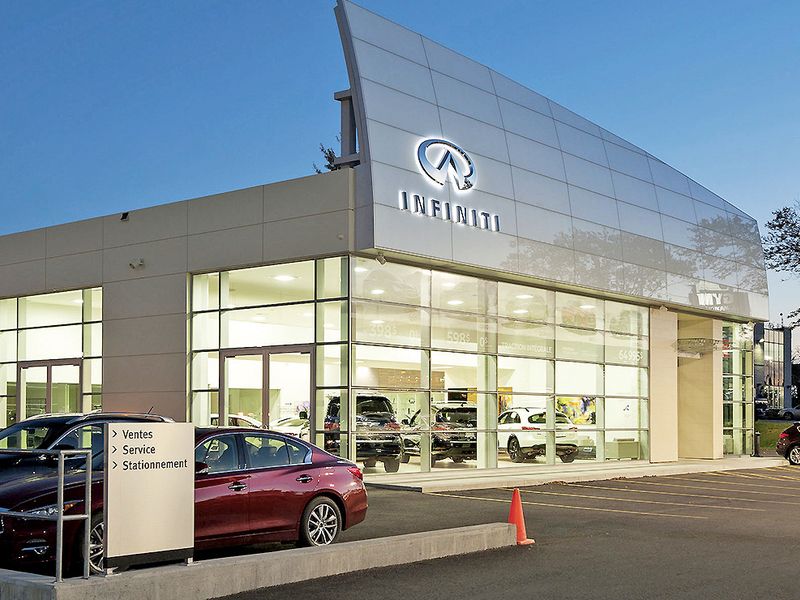
Over the past decade, with rising sales and a promising product road map, Infiniti steered its Canadian dealers to build standalone stores to differentiate themselves from mass-market Nissan.
Since then, Infiniti sales have fizzled, and the product rollout has slowed. Deliveries in Canada tumbled to 5,783 last year after peaking at 12,581 in 2018.
Infiniti is now reversing course — telling the 37 retailers that they may abandon their flashy stores and move operations under their Nissan brand rooftops.
The intent is to help them lower overhead, combining Infiniti and Nissan service departments and back-office operations to achieve better economies of scale, Infiniti Canada Managing Director Steve Rhind told Automotive News last week.
He said the rooftop consolidation plan is not mandatory.
“This is something that we’re making an option for dealers,” he said. “We are working with them when they want to do it.”
Rhind declined to speculate on how many dealers might make the switch. “We are having the conversation, so we don’t know yet how many will go there,” he said.
But the move should be less impactful than in the past since the COVID-19 pandemic has accelerated online sales and vehicle pickup and delivery services.
“Customer expectations are changing,” Rhind said. “So dealers are asking for a different approach to what their facility might be.”
Some dealers are not entirely happy with the reversal in thinking, pointing out that consolidating stores would put them on the hook for new investment to retrofit their Nissan stores.
“Infiniti was telling us we have all this product coming, it was going to be a booming franchise,” said Rick O’Neill, president of O’Neill Auto Group, which operates an Infiniti store in Newfoundland. “Now they are saying we’re not sure the throughput’s going to be what it needs to be.”
O’Neill said he is losing 350,000 Canadian dollars ($278,000) a year on his Infiniti store.
“They now want me to spend even more on my Nissan building to bring Infiniti in,” the dealer said.
Daniel Beaucage, president of Groupe Beaucage in Sherbrooke, Quebec, said he does not plan to shutter his Infiniti store.
Retrofitting his Nissan store to accommodate the Infiniti operation would cost CA$6 million to CA$7 million ($4.8 million to $5.6 million), Beaucage said.
“It’s too much money,” he said. “And I’m still stuck with the Infiniti building.”
To ensure brand differentiation in a combined store, Infiniti requires dealers to have a separate customer entrance and, in most cases, a dedicated service lane.
“It would never be a showroom within the showroom,” Rhind said. “You will have dedicated Infiniti salespeople, dedicated Infiniti service people, so the customer has a premium experience.”
But in many cases that will mean exterior and interior building work and additional investment in new dealership materials, such as furniture and signage, dealers said.
“New decoration, new tiles, everything has to be changed,” Beaucage said.
The shift in retail strategy reflects Infiniti’s diminished market position. Infiniti’s share of the Canadian premium market has slid to 2.8 percent through June 2021, from 5.9 percent in 2014, according to the Automotive News Research & Data Center.
Increased competition has taken a toll on dealers’ gross margins, said Greg Carrasco, vice president of operations at Oakville Infiniti and Oakville Nissan in suburban Toronto.
With auto sales gravitating online, “we don’t need these giant … facilities to be able to sell the same amount of cars,” Carrasco said. “You don’t want to saddle your dealer body with massive overheads when we all know that profitability in the car industry, by and large, has decreased over the last few years.”
Infiniti’s decision to co-locate with Nissan risks tarnishing the brand’s premium image, said Jessica Caldwell, executive director of Insights at Edmunds. As mainstream brands dial up the content in their vehicles, premium automakers are having to differentiate by elevating the brand retail experience, she said.
“Creating an upmarket dealership with amenities and services that appeal to the busy luxury vehicle buyer is an important and clear way to set the tone for a luxury brand,” Caldwell said. “Consumers buying Cartier expect a more upscale retail environment than what’s on offer at Kay Jewelers.”
Some dealers also believe Infiniti’s new real estate plan is a Band-Aid over its real challenge: a need for new products.
“Everybody has good intentions, but the road to hell is paved with good intentions,” Carrasco said. “Infiniti had some great ideas, but changes in global management has meant a delay in the new product coming down.”
Infiniti will roll out a new generation of its QX60 midsize crossover in the fall. It is perceived as a bet-the-franchise launch for the brand. But some worry it might be too little, too late.
“You can’t make a franchise on one model,” O’Neill said. “There is nothing else on the horizon for two years out.”

